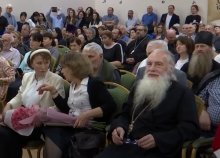
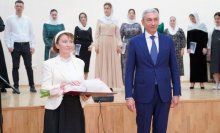
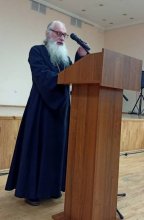
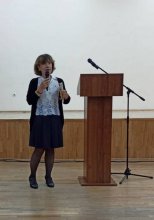
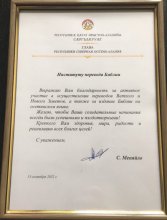
The presentation of the Bible translated into the Ossetic language was held at the National Scientific Library of the Republic of North Ossetia-Alania in Vladikavkaz on September 20, 2022. This is the first ever complete translation of the Bible into the Iron variant of the Ossetic language, spoken by five-sixths of the Ossetic population (about 600,000 people). This publication is combined the New Testament translated by the Institute for Bible Translation and the Old Testament translated by the Bible Society in Russia. This work took 25 years overall.
The Ossetic people are an Indo-Iranian ethnic group who are indigenous to Ossetia, a region situated across the northern and southern sides of the Caucasus Mountains. The homeland of Ossetia is politically divided between the Republic of North Ossetia–Alania in Russia, and the Republic of South Ossetia – the State of Alania. Their native language belongs to the Eastern Iranian branch of the Indo-European language family, with most Ossetians also fluent in Russian as their second language. The majority of the Ossetian people are Orthodox Christians, with sizable minorities practicing the indigenous Ossetic religion of Assianism and Islam.
The presentation of the Ossetic Bible was timed to coincide with the celebration of the 1100th anniversary of Alania's official acceptance of Christianity. Boris Dzhanaev, Chairman of the Government of the Republic of North Ossetia-Alania, took part in the presentation. He said, "A huge work of many years has been done. Today in front of us is the result of the invaluable work of a group of scholars, writers, theologians, and translators. The unique edition will allow studying the Holy Scripture in our native language and most importantly it will remain for posterity for centuries. I am sure that the new edition of the Bible will become a source of spiritual help and grace for the faithful."
Bishop Gerasim of Vladikavkaz and Alania emphasized that the new edition is a translation of the Old and New Testaments into the Ossetic language directly from the original texts in Hebrew and Greek. The bishop noted, "Renowned scholars from Russia, Germany and the Netherlands worked on the project. Consultants, Hebraists and the best Ossetic translators were involved in its realization. The resulting translation is unique. These specialists worked in close contact with the Vladikavkaz and Alan Diocese of the Russian Orthodox Church and used Ossetian artwork in the decoration of the book.”
Archpriest Alexander Troitsky, Chairman of the Board of the Institute for Bible Translation, and Ketevan Gadilia, coordinator of the Ossetic NT project, took part in the presentation. On the eve of the presentation they met with Bishop Gerasim and presented him IBT’s work in the Ossetic and Digor translation projects.
As part of the event, Boris Dzhanaev presented state awards to those who worked on the translation of the Bible into Ossetic. Translators Elizaveta Kochieva and Kazbek Mamukaev were awarded the Medal "In Praise of Ossetia". Exegetical adviser of the NT project Dmitri Asratyan, project coordinators Ketevan Gadilia, Vazha Bagaty, and translator Tamara Bagaty received honorary diplomas as well. IBT was awarded a letter of appreciation from the Head of the Republic of North Ossetia-Alania.

Share: